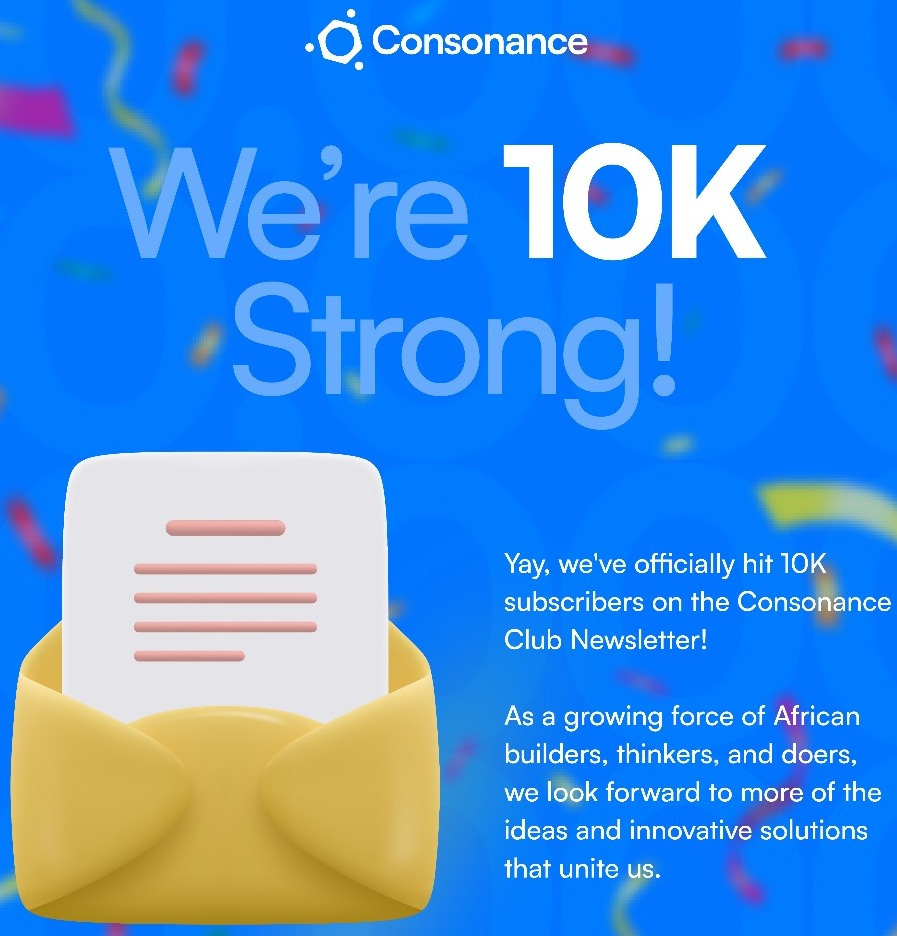Selam, Dear Innovator 👋
*
*
We come bearing BIG NEWS 🎉🎉
Consonance Club is dedicated to educating, informing, and platforming African innovators like you 🫵, who are reshaping the future, one solution at a time. Our newsletter is sure-fire 🔥 way of doing this.
Our entire vibe is shining a spotlight on the innovations that are happening in and for Africa. Lucky for us, 10k of you love what we do!!! 😍 Yay!!
Want more on African Innovations by Africans and the diaspora? Check out our website, IG and X for all the deets.
You’ll love it!
As a founder in today’s fast‑evolving tech landscape, it’s almost certain that at some point, you’ll find yourself at a crossroad: you’ll be driven by vision and urgency, yet uncertain about the foundational steps needed to turn an innovative concept into a resilient, scalable business.
Today’s market demands that tech companies move not only with speed but also with clear foresight of what comes next in future, even when you can’t see it yet.
In today’s newsletter, we’ll help you through:
Picking an incorporation model that keeps you both compliant and nimble
The strategies that you’ll need while building a diverse team 🌍
And finally, give insight into designing operations and governance that grow with your venture, without breaking under complexity ⚙️
Follow the hand 👇👇
Navigating the Early Days
Every tech company in Africa begins with a bright idea, but transforming that spark into a sustainable business requires more than passion. To do this, you need a legal home that shields your personal assets and signals credibility to partners and potential investors, all while making sure to not drown in paperwork (agility is your greatest asset 👀)
In Nigeria, registering an Ltd. company typically takes under two weeks and costs around ₦50,000; in Kenya, a Private Company Limited by Shares goes live in about three days for roughly KES 10,000.
Choosing the right model early on lays the groundwork for cross‑border expansion later (which is supposed to be the goal 💁🏻♀️) without forcing you to reset your structure when you hit new markets.
What many fail to understand is that although a simple sole proprietorship can launch in a weekend, it also exposes you personally to liabilities, if you happen to run into trouble in the future. On the other hand, a full Ltd. shields your personal assets, but there are also demands of regular filings, board meetings, and audited accounts once you hit certain revenue thresholds (often ~$100,000 annual turnover).
Building a Pan‑African Team
As you move from MVP to market‑fit, talent becomes your currency because your company is only as good as the kind of people working in it
Across the continent, developer salaries range from roughly $1,200 per month in Egypt to about $3,200 in South Africa, while customer‑support roles can start as low as $400 in Ghana. So, rather than confining yourself to your city of origin, consider a hybrid model: a central hub for core functions complemented by remote clusters who bring in local market insights, depending on their location.
Sprinkle in monthly/quarterly “innovation days” where any team member can pitch features or tools, and you’ll create an environment that’s conducive to fresh ideas and long-term loyalty. Stats also show that offering profit‑sharing or ESOPs (equity plans) reduces churn by up to 30% 🫡
Next-level Operations, Growth And Such 🫣
Early on, your finance and product roadmaps can all fit neatly into Google Sheets and Trello boards, but, as you approach ₦50 million in annual revenue or open your second country office, manual tracking becomes a liability. That’s when cloud‑based ERPs (Enterprise Resource Planning) will come in handy.
Another step is to automate multi‑currency invoicing, VAT/GST filings, and consolidated reporting. And, if you’re handling customer data, implementing SOC 2 and ISO 27001–aligned policies early can save you from costly breaches, because a single security lapse can erase up to 3% of annual revenue in fines and remediation. Additionally, formalising roles with a simple RACI (Responsibility‑Accountable‑Consulted‑Informed) matrix will ensure that everyone knows who decides what, at any given time.
Also, you’ll want to consider setting up a small advisory board (3–5 members) that meets quarterly to review your KPIs: Monthly Recurring Revenue (MRR), Customer Acquisition Cost (CAC), and Burn Rate.
The perennial question that every African tech founder eventually asks is this: How much structure do I need, and when should I adopt it?
Too little structure means legal headaches, founder disputes, and operational chaos.
Too much formality too soon, and you’ll be bogged down in compliance issues that will seep out and slow down your pace in the market.
Your answer lies in a stage‑gated growth: map out the five key milestones in your journey (like crossing $10k ARR, hiring your first engineer abroad, or registering in a new country) and tie each milestone to a precise structural upgrade. This will keep you lean when you need to be fast, and fortified when the risks escalate.
Keep building! 🥂




